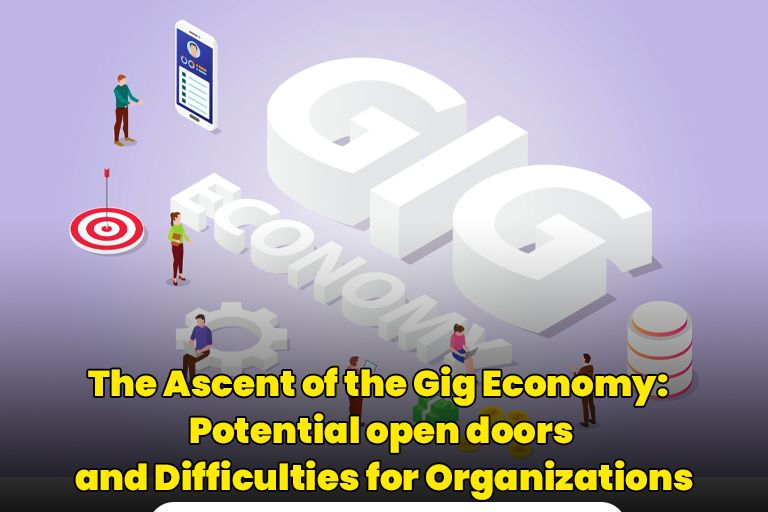The gig economy, described by impermanent and adaptable work plans, has seen huge development as of late. Empowered by innovative progressions and changing perspectives toward work, the gig economy presents two open doors and difficulties for organizations. This article investigates the ascent of the gig economy and its effect on organizations, featuring the possible advantages and deterrents that organizations face in this advancing scene.
- Opportunities for Organizations
- Access to a Different Ability Pool:
The gig economy opens up a tremendous pool of gifted people who incline toward adaptable work game plans. Organizations can take advantage of this ability pool to track down experts with explicit abilities and skills for transient ventures. This permits organizations to gather groups custom fitted to their necessities, prompting expanded development and proficiency.
- Cost-Adequacy:
Employing gig laborers can be savvy for organizations. Rather than keeping an everyday labor force, organizations can connect with gig laborers on an undertaking by-project premise, saving money on costs, for example, benefits, office space, and preparation. This adaptability empowers organizations to scale their tasks rapidly and productively, adjusting to showcase requests.
- Increased Efficiency:
Gig laborers are in many cases profoundly energetic people who endeavor to convey uncommon outcomes. They carry new viewpoints and a craving to establish a long-term connection, as their standing and future work possibilities rely upon their presentation. This drive can convert into expanded efficiency and great results, helping organizations with speed and effectiveness.
- Access to Specific Abilities:
The gig economy permits organizations to get specialty abilities and aptitudes that may not be accessible inside their regular labor force. Whether it’s a web engineer, visual creator, or showcasing planner, organizations can track down experts for explicit undertakings and ventures. This admittance to specific abilities assists organizations with remaining cutthroat and developing in their separate businesses.
- Challenges for Organizations
- Management and Coordination:
Dealing with a different labor force including both full-time representatives and gig laborers can challenge. Organizations need to adjust their administration practices to arrange and coordinate gig laborers into their groups successfully. Correspondence, task distribution, and building a feeling of having a place become vital parts of effective gig specialists the executives.
- Legal and Administrative Contemplations:
The gig economy works in a legitimate hazy situation in numerous purviews. Organizations need to explore complex work regulations and guidelines to guarantee consistency with business norms and shield themselves from legitimate liabilities. Misclassifying gig laborers as self-employed entities can bring about lawful results and reputational harm for organizations.
- Lack of Steadfastness and Congruity:
Gig laborers, commonly, look for adaptable work plans and are not limited by long-haul responsibilities to a solitary manager. This absence of steadfastness and congruity can present difficulties for organizations, especially in areas that require predictable associations with clients or continuous coordinated effort inside groups. Organizations should adjust their techniques to fabricate connections and hold gig laborers who carry worth to their tasks.
- Data Security and Secrecy:
Connecting with gig laborers might include sharing delicate organization data and information. Keeping up with information security and classification can be a huge worry, as gig laborers work outside the conventional office climate. Organizations should lay out strong conventions to safeguard their protected innovation and guarantee information protection, including through classification arrangements and secure correspondence channels.
- Scalability and Adaptability:
The gig economy offers organizations the capacity to increase their activities or down rapidly in light of market requests. During top seasons or when confronted with unexpected undertaking floods, organizations can undoubtedly take advantage of a pool of gig laborers to meet the expanded responsibility. This versatility and adaptability can give an upper hand, permitting organizations to quickly jump all over chances and adjust quickly to changing economic situations.
- Global Ability Access:
With the gig economy, geographic limits are no longer restrictions on recruiting ability. Organizations can now draw in gig laborers from around the world, rising above customary enrollment limitations. This worldwide ability access opens up additional opportunities for organizations to work with people who have interesting viewpoints, social bits of knowledge, and various ranges of abilities, adding to improved innovativeness and development.
- Building Trust and Coordinated effort:
Laying out trust and cultivating coordinated effort can be difficult in the gig economy, where laborers might not have earlier information on the organization’s way of life or group elements. Organizations need to put time and exertion into building solid associations with gig laborers, advancing clear correspondence channels, giving criticism, and coordinating them into an authoritative texture. A powerful coordinated effort is fundamental to guarantee gig laborers line up with the organization’s objectives and convey ideal outcomes.
- Maintaining Organization Culture:
Organizations frequently highly esteem developing areas of strength for a culture that drives worker commitment and steadfastness. In the gig economy, where laborers are not genuinely present in the workplace, keeping a firm culture can be a critical obstacle. Organizations need to track down creative ways of imparting their qualities, mission, and work culture to gig laborers, guaranteeing they feel associated and spurred to add to the association’s prosperity.
- Knowledge Exchange and Maintenance:
Gig laborers carry significant abilities and skills to projects, yet their brief nature can bring about information holes when they continue toward different tasks. Organizations should focus on information move and documentation cycles to catch and hold basic experiences acquired from gig laborers. This guarantees that the association benefits from its commitments even after its commitment closes, forestalling the loss of institutional information.
- Ethical Contemplations:
The gig economy raises significant moral contemplations for organizations. Organizations should guarantee the fair and evenhanded treatment of gig laborers, including giving sensible pay, tending to balance between serious and fun activities, and offering roads for the proficient turn of events. Maintaining moral practices in the gig economy cultivates positive associations with gig laborers, improves notoriety, and adds to the drawn-out manageability of the business.
Conclusion:
As the gig economy proceeds to develop and shape the cutting-edge labor force, organizations should embrace its true capacity while exploring the related difficulties. By utilizing the amazing open doors given by admittance to different abilities, cost-adequacy, specific abilities, versatility, and adaptability, organizations can remain cutthroat and adjust to an always-evolving commercial center. All the while, addressing difficulties connected with the board, lawful consistency, dedication, information security, trust-building, culture support, information maintenance, and moral contemplations will empower organizations to outfit the genuine advantages of the gig economy and construct effective, manageable associations in the unique universe of work.
Read more.. Exploring Assessment Season: Fundamental Methods for Amplifying Allowances and Limiting Liabilities
Read more.. The Effect of Expanded Reality on Driver Help Frameworks and Upfront Consoles





